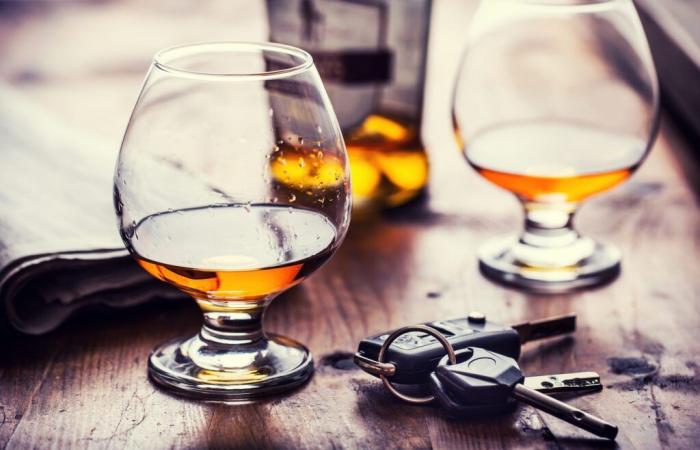Announced last spring by the former Higgs government, the new measures surrounding impaired driving will come into force in just a few weeks, on January 1, 2025.
This new legislation aims to further crack down on impaired driving in the province. Although more complex, it offers law enforcement officers an alternative to the criminal route depending on the seriousness of this type of offense.
Inspired by measures implemented in certain other Canadian provinces – including British Columbia, Alberta and Manitoba – this program aims to reduce accidents caused by drunk driving.
The first notable change concerns drivers caught with a blood alcohol level of 0.05 to 0.08, therefore with a blood alcohol level close to the permitted limit without reaching or exceeding it. Individuals intercepted will automatically have their driver’s license suspended for a period of seven days and their vehicle towed to impound for a period of three days. They will also be imposed steep administrative (monetary) penalties.
In the event of a repeat offense, the license suspension and impoundment will increase. The objective of this measure is to remove drivers who have been caught drinking from the road more quickly.
The second change affects drivers with an alcohol level of 0.08 or more. Instead of systematically resorting to criminal action, the RCMP will now be able to opt for administrative sanctions in order to manage cases deemed lighter.
Currently, the only option is a charge under the Criminal Code of Canada. The person caught in default automatically loses their driving license for three months and is assigned a court date for their appearance. That said, due to backlogs at the Court, some cases only end up being resolved several months (18 months in certain cases) after the alleged offense, which means that an at-fault driver can get back on the road without his case not be settled in court.
Thus, as of January 1, the police will have the discretion to apply administrative sanctions rather than judicial sanctions. These sanctions also include a loss of driving license for three months, but the individual who accepts this path will be able to follow a driving rehabilitation course, pay the penalties (fines) and have an immobilizer device with a breathalyzer installed on their car (for a period of one year) if he wants to regain his driving privileges.
With the administrative option, the offense will be entered in the driver’s record of the individual found at fault, but it will not appear in their criminal record.
According to the ministry, this measure aims to accelerate the imposition of sanctions by avoiding the Court while ensuring that those at fault will quickly take corrective measures. For their part, the individual will benefit from the fact that these sanctions will not result in a criminal record.
A persistent scourge
At the Royal Canadian Mounted Police (RCMP) in the province, they say they fully support the new measure adopted by Fredericton. According to Hans Ouellette, spokesperson for the RCMP, this change represents a necessary response to improve road safety and save lives.
“This program is a complement to existing sanctions, but above all it allows us to act more quickly on road safety,” he explains.
It must be said that drunk driving remains a major problem and a significant cause of death on the province’s roads. According to the RCMP, each year, approximately 1,000 people are convicted in the province for drunk driving, and this offense is still the leading criminal cause of death on provincial roads. In 2023, for example, 13 fatal collisions were caused by drivers whose blood alcohol content was suspected as a contributing factor.
“Despite awareness, drunk driving still represents a high risk on our roads, a risk for the driver certainly, but also for other users,” indicates Mr. Ouellette, insisting on the fact that each death linked to Alcohol on the roads is avoidable.
“Ultimately, it all comes down to the decision of individuals whether or not to drive their vehicle after drinking,” he adds.
Provincial authorities and the RCMP hope that the new legislation, by combining enforcement and prevention, will help reduce the number of impaired drivers on New Brunswick roads.
“By removing drunk drivers more quickly, we hope to limit the number of fatal collisions and serious injuries. We also hope that this will lead to a reduction in the risk of recurrence,” maintains Mr. Ouellette.
He also insists on one point, namely that these measures are not intended to decriminalize drunk driving.
“Impaired driving remains a crime, but these new administrative sanctions allow us to respond more effectively. If all of these measures save even one life, it will have been a success,” concludes Mr. Ouellette.
Unclog the courts
If the measure is well received by the police, it is also well received by lawyers.
Criminal lawyer, Mikaël Bernard often deals with cases of drunk driving. He believes that the new measures could help unclog the courts.
“Depending on the cases, the police will now have the discretion to issue a ticket under the Motor Vehicle Act rather than charge the person criminally. This is still a major change, because I believe that one in three cases in Provincial Court is one of drunk driving. There will always be cases of drunk driving for more serious cases – such as accidents, injuries, repeat offenses, etc. -, but my reading of these changes is that overall, it will free up a lot of files from this court, which will allow other criminal cases to move forward more quickly,” believes the lawyer.
He also believes that the fact that a person can escape a criminal record is also beneficial.
“For several cases, we are talking about just one drop of alcohol too much, which makes the difference. And this results in a person ending up with a record that deprives them of employment opportunities and travel. Taking advantage of the Motor Vehicles Act can therefore prove beneficial for cases that find themselves at the lower end of the spectrum in terms of severity in terms of their breath sample,” he says.






